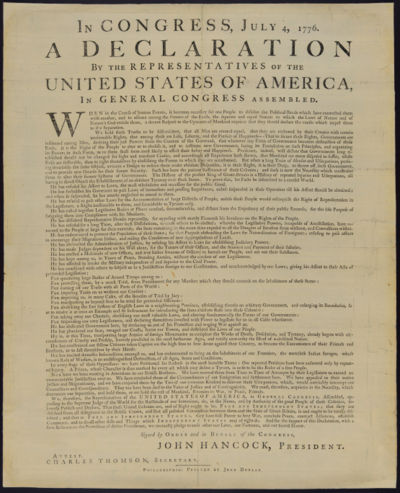U.S. Declaration of Independence: Difference between revisions
imported>Richard Jensen (clarify lede about shat it did) |
imported>Richard Jensen (clarify lede) |
||
| Line 1: | Line 1: | ||
{{subpages}} | {{subpages}} | ||
The '''Declaration of Independence''' | The '''Declaration of Independence''', unanimously approved by the second Continental Congress on July 4, 1776, created a new nation, the "United States of America." It formally "dissolved the connection" between the [[Thirteen Colonies|thirteen states]] which had acted as the "United Colonies" and Great Britain. July 4 is still celebrated as the nation's birthday. | ||
The "Declaration Committee," which included [[Thomas Jefferson]] of Virginia, [[Roger Sherman]] of Connecticut, [[Benjamin Franklin]] of Pennsylvania, [[Robert R. Livingston]] of New York, and John Adams of [[Massachusetts]], was appointed by Congress on June 11, 1776, to draft a declaration in anticipation of an expected vote in favor of American independence, which occurred on July 2. <ref name="committee members">{{cite web | The "Declaration Committee," which included [[Thomas Jefferson]] of Virginia, [[Roger Sherman]] of Connecticut, [[Benjamin Franklin]] of Pennsylvania, [[Robert R. Livingston]] of New York, and John Adams of [[Massachusetts]], was appointed by Congress on June 11, 1776, to draft a declaration in anticipation of an expected vote in favor of American independence, which occurred on July 2. <ref name="committee members">{{cite web | ||
Revision as of 16:29, 1 October 2007
The Declaration of Independence, unanimously approved by the second Continental Congress on July 4, 1776, created a new nation, the "United States of America." It formally "dissolved the connection" between the thirteen states which had acted as the "United Colonies" and Great Britain. July 4 is still celebrated as the nation's birthday.
The "Declaration Committee," which included Thomas Jefferson of Virginia, Roger Sherman of Connecticut, Benjamin Franklin of Pennsylvania, Robert R. Livingston of New York, and John Adams of Massachusetts, was appointed by Congress on June 11, 1776, to draft a declaration in anticipation of an expected vote in favor of American independence, which occurred on July 2. [1]
Its primary authorship is credited to Thomas Jefferson, and early versions of the manuscript exist dating to June 1776.[2]
Signers
There are 56 signatures on the declaration of independence [3]
- Georgia
- North Carolina
- South Carolina
- Massachusetts
- Maryland
- Virginia
- Pennsylvania
- Delaware
- New York
- New Jersey
- New Hampshire
- Massachusetts
- Rhode Island
- Connecticut
References
- ↑ Declaring Independence: Drafting the Documents. Retrieved on 2007-08-04.
- ↑ Transcription of the Fragment of the Composition Draft of the Declaration of Independence. Retrieved on 2007-08-04.
- ↑ Signers of the Declaration. Retrieved on 2007-08-04.
